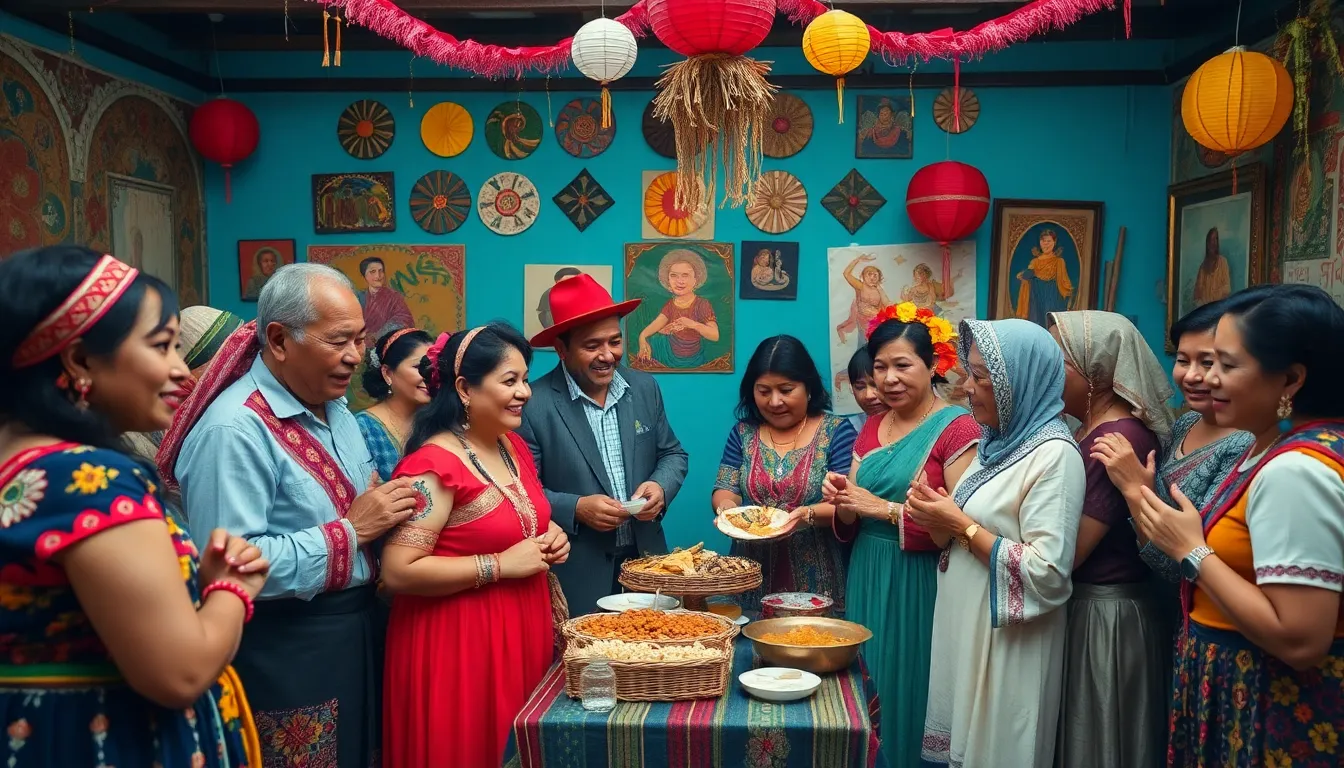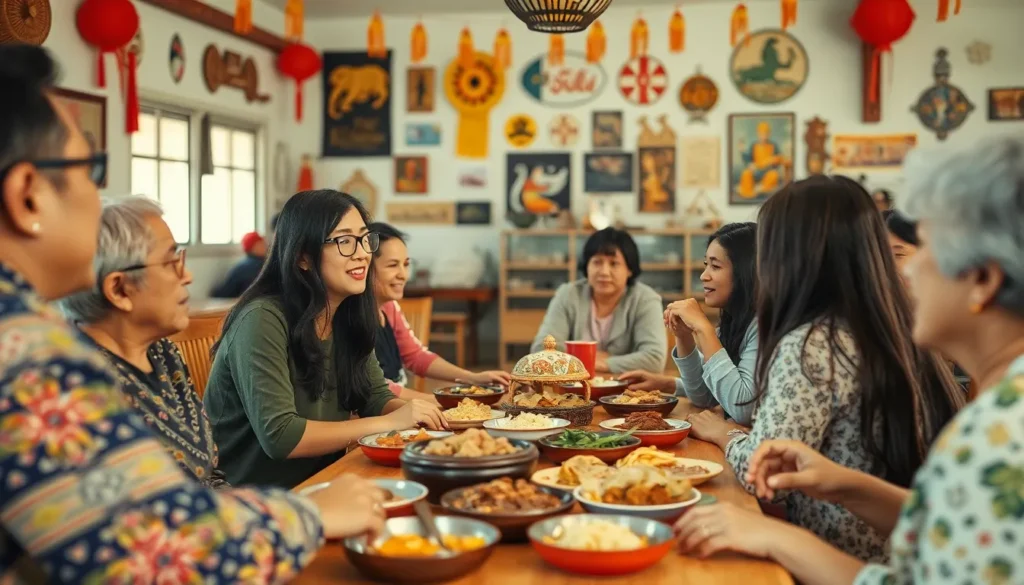Cultural anthropology isn’t just about studying strange rituals or bizarre customs. It’s the ultimate backstage pass to understanding what makes us tick as humans. From the way people celebrate birthdays to the foods they devour, cultural anthropology dives deep into the quirks and nuances that shape societies.
Imagine being a fly on the wall at a family dinner in Italy or witnessing a colorful festival in India. That’s the magic of cultural anthropology—it reveals the rich tapestries of human experience. By exploring diverse cultures, it uncovers the common threads that bind us all, proving that while we may dance to different tunes, we’re all part of the same grand performance. Whether you’re a curious traveler or a couch philosopher, cultural anthropology offers a delightful journey into the heart of humanity.
Table of Contents
ToggleOverview of Cultural Anthropology
Cultural anthropology plays a crucial role in examining human societies. It centers on understanding cultural practices, beliefs, and the intricate web of relationships that shape human experiences.
Definition and Scope
Cultural anthropology investigates the diverse ways of life found across various cultures. Researchers in this field analyze customs, traditions, social structures, and symbols that influence behavior. Terms like ethnography and participant observation define the primary methods employed in gathering data. These tools allow anthropologists to immerse themselves in different communities and understand cultural phenomena firsthand. The scope includes everything from kinship patterns and economic systems to religious practices and artistic expressions. This expansive approach offers insight into the complexities of human society.
Importance in Social Sciences
Cultural anthropology contributes significantly to the social sciences by providing a holistic view of humanity. Insights derived from anthropological studies help inform policies, promote social cohesion, and enhance cultural appreciation. Anthropologists often collaborate with researchers in other disciplines like sociology and psychology, enriching interdisciplinary understanding of human behavior. By examining cultural diversity, this field fosters empathy and comprehension among people, emphasizing the interconnectedness of societies. Overall, cultural anthropology’s critical analyses promote awareness of cultural differences, serving as a powerful tool for social change.
Key Concepts in Cultural Anthropology

Cultural anthropology examines vital relationships between cultural practices and societal structures. It focuses on how different elements of culture, like beliefs, customs, and values, shape human interactions. Various social constructs, including family, religion, and economy, influence individuals’ behaviors and perceptions. Understanding these connections reveals the complexity of human experiences across diverse cultures.
Culture and Society
Culture encompasses the shared beliefs, practices, and values that define a group. It provides a framework for social interactions and helps individuals navigate their environment. Societies function through culturally specific norms that guide behavior and establish roles. Expressions of culture, like art, language, and rituals, create a sense of belonging and identity. Analyzing these facets highlights how culture adapts over time while maintaining connections to historical roots.
Ethnography and Fieldwork
Ethnography serves as a primary method in cultural anthropology, allowing researchers to gather data through immersion in communities. Fieldwork involves living within a culture to observe and interact with its members, generating firsthand insights. This in-depth approach facilitates understanding of social dynamics and cultural practices that may not surface in interviews or surveys. Collecting qualitative data enriches anthropological knowledge, capturing the essence of people’s lives and their interactions with the broader society.
Methodologies in Cultural Anthropology
Cultural anthropology employs diverse methodologies to explore human cultures deeply. Researchers utilize various techniques to gather insights, allowing for a nuanced understanding of societal norms and behaviors.
Qualitative Research Techniques
Qualitative research techniques play a critical role in cultural anthropology. These methods focus on understanding experiences and meanings that individuals ascribe to their cultural practices. Interviews, focus groups, and case studies provide rich, detailed narratives that enhance data collection. Researchers often analyze the context behind behaviors, facilitating a deeper comprehension of cultural phenomena. Such approaches emphasize the importance of subjective interpretations, capturing the complexity of human interactions within social frameworks.
Participant Observation
Participant observation is a cornerstone of cultural anthropology research. This method involves immersing oneself in a community to experience daily life and cultural practices firsthand. By engaging with community members, researchers build relationships that promote trust and openness. Observing rituals, traditions, and interactions in situ provides valuable context that surveys and interviews may overlook. Through this hands-on approach, anthropologists gain intimate knowledge of lived experiences, ensuring a comprehensive understanding of cultural systems and social structures.
Influential Theories and Schools of Thought
Cultural anthropology encompasses various influential theories that shape its understanding of human societies and behaviors. Two prominent theories stand out: symbolic interactionism and structuralism.
Symbolic Interactionism
Symbolic interactionism focuses on the meaning individuals derive from social interactions. This theory emphasizes that people create their realities through shared symbols and language. Researchers explore how cultural symbols—like rituals or gestures—shape social relations. Additionally, it highlights the role of context in shaping these interactions. Anthropologists applying this theory investigate how meaning evolves within cultural contexts, illustrating the dynamic nature of human relationships. Understanding these interactions helps reveal how societies negotiate identities and social roles.
Structuralism
Structuralism, pioneered by Claude Lévi-Strauss, analyzes the underlying structures that govern cultural practices. It proposes that human culture can be understood through patterns and relationships that exist across different societies. Emphasizing binary oppositions, this theory explores how elements within cultures interact to form cohesive systems. Structuralists argue that these systems reflect deep-seated patterns of thought, shaping social behaviors and beliefs. Analyzing myths, kinship systems, and language, anthropologists uncover universal structures that guide cultural expressions. This framework provides insights into the commonalities among diverse cultures, illustrating the shared foundations of human experience.
Contemporary Issues in Cultural Anthropology
Cultural anthropology faces a variety of contemporary issues that reflect the complexities of human society. Global interactions introduce significant changes in cultural practices, relationships, and identities.
Globalization and Cultural Exchange
Globalization enhances cultural exchange, leading to a fusion of traditions and practices. Many communities adapt elements from foreign cultures while retaining their unique identities. This phenomenon often creates hybrid cultures that reflect a blend of influences, offering new perspectives on what constitutes cultural authenticity. Anthropologists study these changes to understand their implications for social cohesion. They analyze the impact of technology and media in disseminating cultural elements, noting how easy access to information reshapes cultural narratives. Cultural exchange can foster appreciation and understanding, however, it may also lead to cultural homogenization, raising concerns about the loss of distinct traditions.
Cultural Identity and Ethnic Conflict
Cultural identity plays a crucial role in shaping individual and group dynamics. Strong identities can unite communities, but they can also contribute to conflict, particularly when different groups vie for recognition or resources. Ethnic tensions often arise as globalization impacts local identities. In many cases, marginalized communities assert their cultural heritage as a response to perceived threats from dominant cultures. Cultural anthropologists explore these conflicts to uncover underlying social structures and historical contexts. By examining the intricacies of identity formation, they shed light on how cultural narratives influence power dynamics. Understanding cultural identity helps clarify the complexities of ethnic conflict, aiding in the pursuit of conflict resolution strategies.
Cultural anthropology stands as a vital lens through which to view the complexities of human life. By diving deep into the rich tapestry of cultural practices and beliefs, it fosters a greater understanding of the world’s diverse societies. This field not only sheds light on the common threads that bind humanity together but also highlights the unique expressions that define individual cultures.
As cultural anthropologists continue to explore the nuances of human behavior, their findings have far-reaching implications for social cohesion and policy development. The insights gained from this discipline are crucial for promoting empathy and appreciation among different communities. Ultimately, cultural anthropology serves as a powerful tool for navigating the intricate landscape of human relationships and societal structures.





